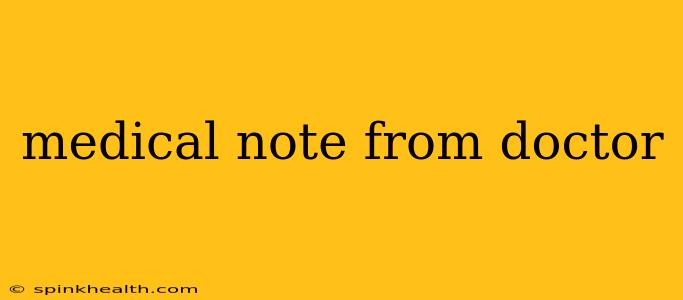Navigating the World of Medical Notes from Your Doctor: A Comprehensive Guide
Getting a medical note from your doctor might seem like a simple task, but understanding the process, the purpose, and the potential implications can make a world of difference. This guide will unravel the intricacies of obtaining and utilizing these crucial documents, addressing common questions and concerns along the way. Think of it as your personal handbook for navigating the often-unclear landscape of doctor's notes.
What exactly is a medical note, and why would I need one?
Imagine a medical note as a concise summary of your visit to the doctor. It's a formal record detailing your health status, diagnosis (if any), treatment plan, and any other relevant information discussed during your appointment. You might need one for various reasons: to excuse an absence from work or school, to support an insurance claim, to provide documentation for disability benefits, or even for personal record-keeping. The specific content and purpose of the note will vary depending on your individual needs.
My own experience with needing a medical note involved a nasty bout of influenza. Bedridden for a week, I needed a note to excuse my absence from work. The note my doctor provided wasn't just a simple "sick" note; it detailed my symptoms, the diagnosis, and the prescribed treatment, ensuring my employer understood the severity of my illness.
How do I request a medical note from my doctor?
The process is usually straightforward. The best approach is to simply ask your doctor during your appointment or contact their office beforehand. Most clinics have specific procedures for requesting medical documentation, which might involve filling out a form or providing the necessary details, like the reason for needing the note and where it needs to be sent. Be prepared to provide identification and possibly authorization for release of information. Don't hesitate to clarify any questions you may have regarding the process.
Remember, politeness goes a long way. A simple, "Doctor, I'll need a note for work," often suffices.
What information is typically included in a medical note?
A typical medical note will include, at minimum, the date of the appointment, your name and date of birth, the reason for your visit, your diagnosis (if applicable), and the doctor's signature and contact information. Further details might include prescribed medications, treatment recommendations, limitations (e.g., restricted activities), and the expected duration of illness or recovery. The level of detail will depend on the reason for requesting the note.
Some notes might be quite brief, particularly if it's for a simple ailment requiring minimal treatment. Others, like notes related to ongoing conditions or serious illnesses, will be more comprehensive and detailed.
How long does it take to get a medical note?
The turnaround time depends on the doctor's office workload and the complexity of the note. Some offices may provide the note immediately following your appointment; others may require a few business days. It's always a good idea to inquire about the estimated processing time when you request the note to avoid any potential delays.
My experience has varied. Sometimes I received the note right away, printed out at the end of the appointment. Other times, it took a couple of days to arrive via mail or email.
Are there any fees associated with obtaining a medical note?
Many doctors' offices charge a fee for medical notes, particularly if they are for non-medical purposes (like an absence excuse from work). The fee varies based on location and the clinic's policies. It's crucial to inquire about potential costs before requesting the note to avoid surprises.
What should I do if I'm denied a medical note?
If your request for a medical note is denied, understand the reason why. Sometimes, the reason might be justified, such as if the request is for an unethical or illegal purpose. If you believe the denial is unwarranted, you can politely inquire about the specific policy and explore alternative options. You might consider speaking with a higher authority within the practice or seeking legal counsel, if necessary. This is a rare occurrence but knowing your options is essential.
This guide aims to equip you with the knowledge to navigate the process of obtaining a medical note from your doctor with confidence. Remember, clear communication and understanding of your needs are key to a smooth and successful process.

